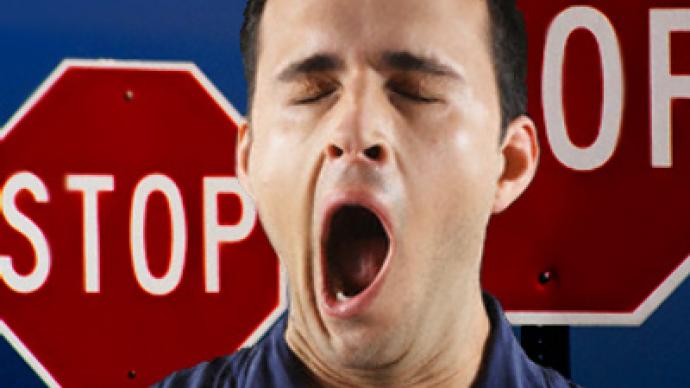Yawn if you want to slow down!

“Fairy Godmother” type cars are looming with the invention of the “yawn detector”. Are these devices vital assets pacifying police and making roads safer? Or unnecessary accessories that state the obvious?
Cruising gently at 48 miles per hour down a 50 mph dual carriageway in Lancashire, 29-year-old Susanna Jackson did not believe she was breaking any laws as she returned home in rush hour after a grueling 10-hour shift on her feet. The veterinary nurse was therefore understandably surprised when she was pulled over by police at traffic lights for committing the most sinful of felonies – yawning.
Being uncouthly and persistently asked if the reasons to her clear “fatigue” were because she had been drinking or taking drugs, Miss Jackson’s already long and tiring day was made significantly longer as she spent 20 minutes showing two police officers her vehicle and identity documents, whilst another coarsely scrutinized her car for any incriminating “evidence”. The young nurse was justifiably upset and somewhat offended by what she describes as “incrimination”.
“They kept asking me why I was yawning and weren’t interested when I said I had been working for 10 hours and was tired. When I was finally allowed to drive away, I felt like I was a criminal. It was very embarrassing,” Miss Jackson told RT.
Feeling drowsy whilst being behind the wheel is an affliction that probably all motorists have endured at some point. Although driving whilst being tired is undoubtedly dangerous, it is not a criminal offence, and therefore regulating or implementing any laws or strategies to control it is difficult. According to the US National Highway Traffic Safety Administration, people being tired at the wheel cause an estimated 100,000 road accidents in the US each year.
“Human fatigue has been a persistent factor in far too many transportation accidents,” says the National Transportation Safety Board (NTSB).
In order to reduce significantly the number of fatigue-related accidents, it is the NTSB’s aim to deploy new strategies and technologies designed to assist tired drivers. Engineers from Mercedes-Benz have introduced various safety systems intended to help fatigued drivers, like the Electronic Stability Program and Brake Assist, both of which have contributed to the reduction of road accidents. Although extensive research has been carried out to understand and recognize the biological changes of drivers experiencing fatigue, most previous methods are expensive and have been perceived as unrealistic. Connecting drivers to an electro-cardiogram machine to analyze heart and brain activity has been considered, but would be impractical and costly.
Scientists from India and America believe they have the answer by the means of an in-car “yawn-detector” system, said to be a cost-effective and convenient method in the prevention of accidents caused by motorists being tired. Aurobinda Mishra from Vanderbilt University in Nashville has been working alongside Mihir Mohanty and colleagues in West Bengal, and has developed image-processing software, which is placed inside the car and can detect a driver yawning by analyzing a series of facial expressions. When a yawn has been accurately identified it then triggers a warning signal to alert drivers to take a break or slow down.
Freight driver Mark Jenson regularly drives across Europe and is well aware of the hazards of “dozy driving”. Jenson witnessed a fatality in France this year, in which a young motorist plunged under the wheels of an oncoming truck after momentarily falling asleep at the steering wheel. The driver commented:
“I would gladly invest in a system that would deter [tired drivers] and therefore prevent [fatigue-related] deaths from occurring. And it is about time. If they can direct you from Liverpool to Timbuktu via a satellite, then you’d think they would have invented a method to warn you of doing something so dangerous as fatigue driving.”
Although “slowing a driver down” is not the only potential asset of a device that can detect tiredness. If systems like the “yawn detector” were commonly fitted into vehicles, traffic police may not be as intent on harassing motorists for doing something as innocent as yawning.
Although Susanna Jackson is usually indifferent to gadgets like sat-navs, since her recent ordeal at the traffic lights, she would welcome a yawn detector system, if not only to appease the police.
Miss Jackson says, “If it meant you were less likely to be pulled over by police and then given a grilling, then yes I would invest in a yawn detector. But not for any other reason.”
Although not everybody is as enthusiastic about the potential “dual-assets” of a “yawn detector”system. Cars becoming increasingly “human”, and that can keep a watchful eye over their drivers and give them a gentle nudge when they start to get tired, is for some, an unnecessary embodiment of a society’s love for the surplus. Bruce Johnson finds this kind of equipment intrusive, and cannot understand people’s insistence in purchasing needless and expensive items. When asked about the yawn detector, the 53-year-old teacher told RT:
“Whatever will they come up next? If you are tired, you know about it and you open the window or pull over for a cup of coffee. You certainly do not need a camera stuck in your face to tell you so. As for “sat-navs”! What happened to a good old map?”
The very nature of tiredness makes it hard to prove whether a driver being fatigued has caused an accident. Because of this ambiguity, road safety experts believe fatalities caused by tired drivers are likely to be much higher than the statistics show. Installing features that may prevent deaths – however ambiguous – has to be an important aim. Transforming a car into a “fairy godmother” that “waves a magic wand” to impede fatigue may prove to be, for some drivers, a little annoying. Although maybe not as annoying as a haughty police officer unfairly delaying innocent motorists from getting home after a hard day at work.
Gabrielle Pickard for RT












